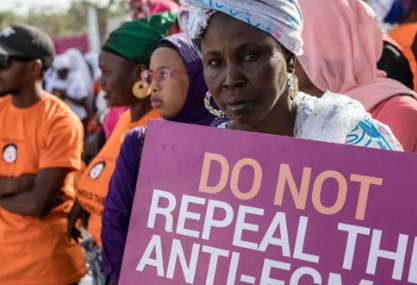The barbaric practice is still in force all over Africa and in some Middle Eastern nations.
In a significant move, Gambia’s lawmakers have rejected a bill aimed at overturning the 2015 ban on female genital mutilation (FGM). The decision was made before the bill’s third and final reading, which was scheduled for later this month.
Speaker of Parliament Fabakary Tombong Jatta announced that the majority of MPs voted against the bill. Human rights groups and the UN had urged MPs to reject the bill, which was introduced in March under pressure from some Muslim clerics.
#Gambia parliament rejects bill to end ban on female genital mutilation:
Gambian lawmakers have voted to uphold a 2015 ban on female genital mutilation (FGM), rejecting a controversial bill seeking to overturn the law, after months of heated debate and international pressure.… pic.twitter.com/rcrnrbEdSL
— THEOGENE (@theogene_h) July 15, 2024
Gambia is among the top ten countries with the highest rates of FGM, with 73% of women and girls aged 15 to 49 having undergone the procedure. The draft law, presented by Almameh Gibba, was rejected after MPs voted against all its proposed clauses. Jatta declared the legislative process exhausted, preventing the bill from moving to the third reading.
When introduced in March, the bill had initially been approved by a majority of MPs, raising concerns that Gambia might become the first country to overturn a ban on FGM. The practice’s most severe form involves removing the clitoris and stitching the genitals closed, preventing sexual enjoyment.
The 2015 ban on FGM in Gambia imposed fines and prison sentences of up to three years for perpetrators, and life sentences if a girl died as a result. Despite FGM being banned in over 70 countries worldwide, it remains prevalent in some Muslim-majority nations, including Gambia.
Gambia’s parliament rejects bill to allow FGM pic.twitter.com/KHn07tHw49
— Reimund Burress (@BuckSperry) July 15, 2024
ActionAid, a rights lobby, warned that lifting the ban would jeopardize Gambia’s progress in combatting violence against women and girls. Binta Ceesay, ActionAid Gambia’s women’s rights manager, stated, “We as campaigners fought tooth and nail to bring about a ban and an end to FGM.”
According to the UN, more than 230 million girls and women globally have undergone FGM. The rejection of the bill is seen as a victory for human rights advocates and a step forward in protecting the rights and health of women and girls in Gambia.
Key Points:
i. Gambia’s parliament has rejected a bill to overturn the 2015 ban on female genital mutilation (FGM).
ii. The decision was made before the bill’s third reading, preventing it from moving forward.
iii. Gambia has one of the highest rates of FGM, with 73% of women and girls aged 15 to 49 affected.
iv. The 2015 ban includes fines and prison sentences, with life sentences if a girl dies due to FGM.
v. Human rights groups and the UN welcomed the rejection, viewing it as crucial for protecting women’s and girls’ rights in Gambia.
Kirk Volo – Reprinted with permission of Whatfinger News



